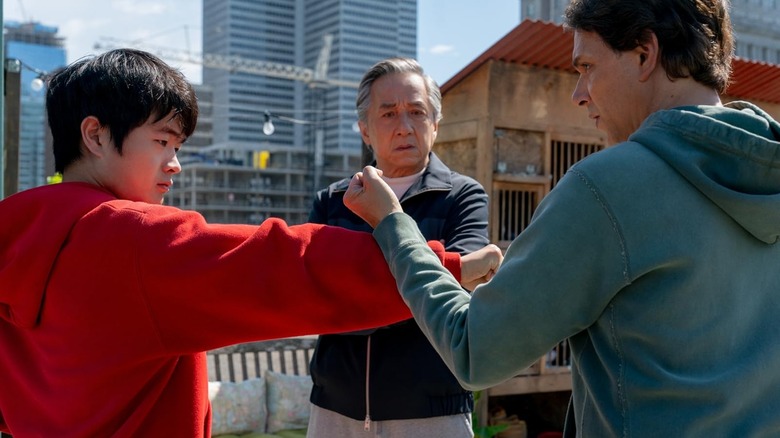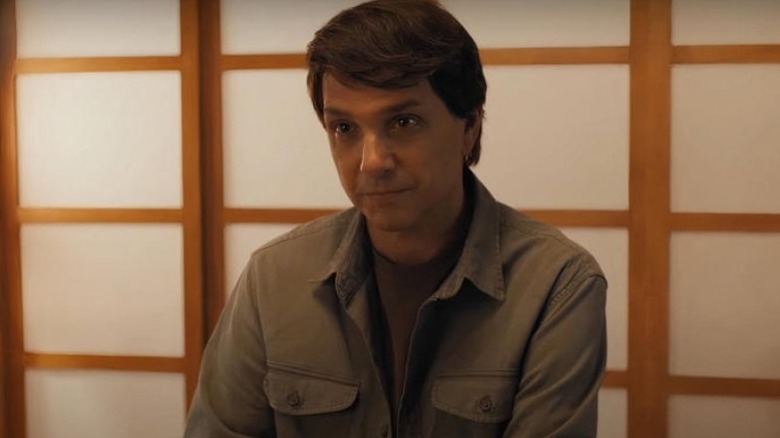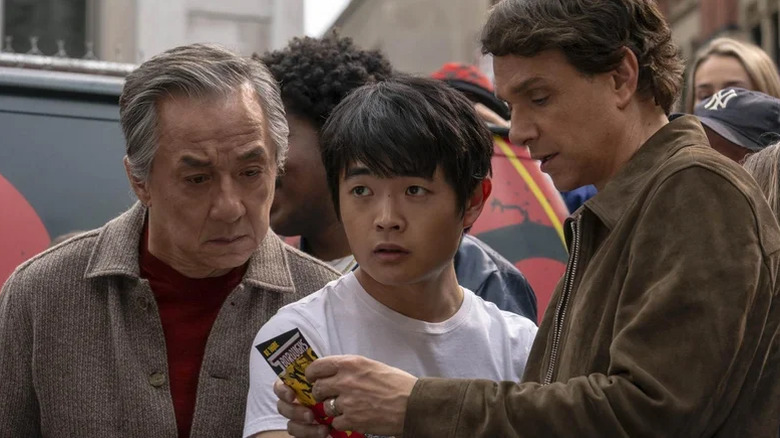The Biggest Selling Point Of Karate Kid: Legends Hurts The Movie The Most
"Karate Kid: Legends" really likes to tell its audience that it's about two branches of the same tree. In-universe, this refers to the kung-fu that Jackie Chan's Mr. Han teaches and the karate that Pat Morita's Mr. Miyagi used to practice. In reality, however, this can also apply to "Karate Kid: Legends" being a tale of two movies at odds with each other. The first movie is a fantastic reconstruction of the "Karate Kid" formula and tropes, with the titular kid becoming a teacher rather than being a student.
It helps that Ben Wang is a really good lead. He portrays his character, Li Fong, as a relatable and charismatic underdog with a painful past that you can't help but root for. And yet, he is not completely defenseless, as for the first time the protagonist of a "Karate Kid" title already has some martial arts knowledge at the start of the story. This makes Li a unique character in the franchise. It gives him more confidence, allowing him to form a fascinating mentor-mentee relationship with local pizza joint owner Victor (Joshua Jackson). As a sequel to the 2010 "The Karate Kid," the film makes for a fun continuation of the story of Mr. Han, who is the funniest part of the movie thanks to his eccentric shifu ways and badass displays of martial arts (as only Jackie Chan could do).
The big problem lies with the second movie within "Legends," which is when it unites both branches of the "Karate Kid" property and brings the world of the 2010 "Karate Kid" into that of the original 1984 film by introducing Ralph Macchio's Daniel LaRusso to the mix. Mr. Han and Daniel's meeting was by far the biggest selling point in the film's marketing, but it's also what hurts the movie the most (that and the severe lack of Jaden Smith's Dre Parker).
Daniel LaRusso makes little more than a glorified cameo in Karate Kid: Legends
The problem with Daniel's appearance in "Karate Kid: Legends" is that it feels pointless. "Karate Kids" fans have spent the last six years watching the character overcome personal issues, finally get over his rivalry with Johnny Lawrence (William Zabka), and help defeat Terry Silver (Thomas Ian Griffith) once and for all on the series "Cobra Kai." By comparison, his role in "Legends" essentially amounts to little more than a glorified cameo.
What's more, if you removed Daniel entirely, "Karate Kid: Legends" would be a much tighter narrative and a better film overall.
The reason is simple. We only really see Daniel about two-thirds into the film's runtime, at which point he only joins as a co-teacher in the lead-up to the big karate tournament at the end of the movie. Even then, Daniel has zero connection to Li and not much in terms of wisdom to impart. (That task falls to Mr. Han.) Indeed, at every turn in "Karate Kid: Legends," Daniel is outshone by his kung-fu counterpart when it comes to action scenes, charisma, and character depth. The film makes no attempt to explore Daniel's life outside of him helping to teach Li karate, much less what's going on with him personally at this point in time. Mr. Han, on the other hand, has a meaningful connection to Li, being both his great-uncle and shifu.He immediately recognizes that the movie's requisite martial arts tournament is not just an economic opportunity to help Li's friends, but it's also something Li needs to do in order to overcome his feelings of guilt and grief over his brother's tragic death.
If you've watched "Cobra Kai" then Daniel's reluctance to train Li and the joy he gets from spreading Miyagi's teachings come across as redundant and hollow, given that he already went through all of this across all six seasons of the Netflix show (which "Karate Kid: Legends" barely even acknowledges). But even if you haven't seen that gem of a series, then Daniel still doesn't really get to do anything of note in this film.
There was no need to connect both halves of the Karate Kid franchise
So, Daniel has no prior connection to Li, and "Karate Kid: Legends" puts little effort into creating a sensei-student bond between them, which makes having both Daniel and Mr. Han together in the same movie redundant. Other than some fun moments where the two bicker about the best technique (which "Karate Kid" fans have seen plenty of already in "Cobra Kai"), the filmy simply gains nothing from giving Li two teachers.
The first act of "Kara Kid: Legends," where we see Li teach a former boxer some kung-fu moves and become a teacher rather than remain a student, is engaging and inventive. Even when we're forced to deal with yet another karate tournament, Li's backstory with his brother makes his journey compelling (not to mention, it's just plain fun to watch Mr. Han be an eccentric kung-fu badass). But did we really need to tie both halves of the "Karate Kid" universe together? Absolutely not. Other than an all-too-brief cameo at the very end of the movie (without a doubt the funniest scene in the entire film), there are no real connections to "Cobra Kai" or even an acknowledgement of how the "Karate Kid" franchise has grown since 1984.
If the only connective tissue is that Daniel took a brief week-long trip to New York at some random time without it affecting anything else, why should fans of both halves of the "Karate Kid" franchise care? Macchio is a good actor and proved throughout "Cobra Kai" that there can be more to the Daniel LaRusso character other than his past as a former underdog. Unfortunately, we don't see any of that in "Karate Kid: Legends."
"Karate Kid: Legends" is now playing in theaters.


